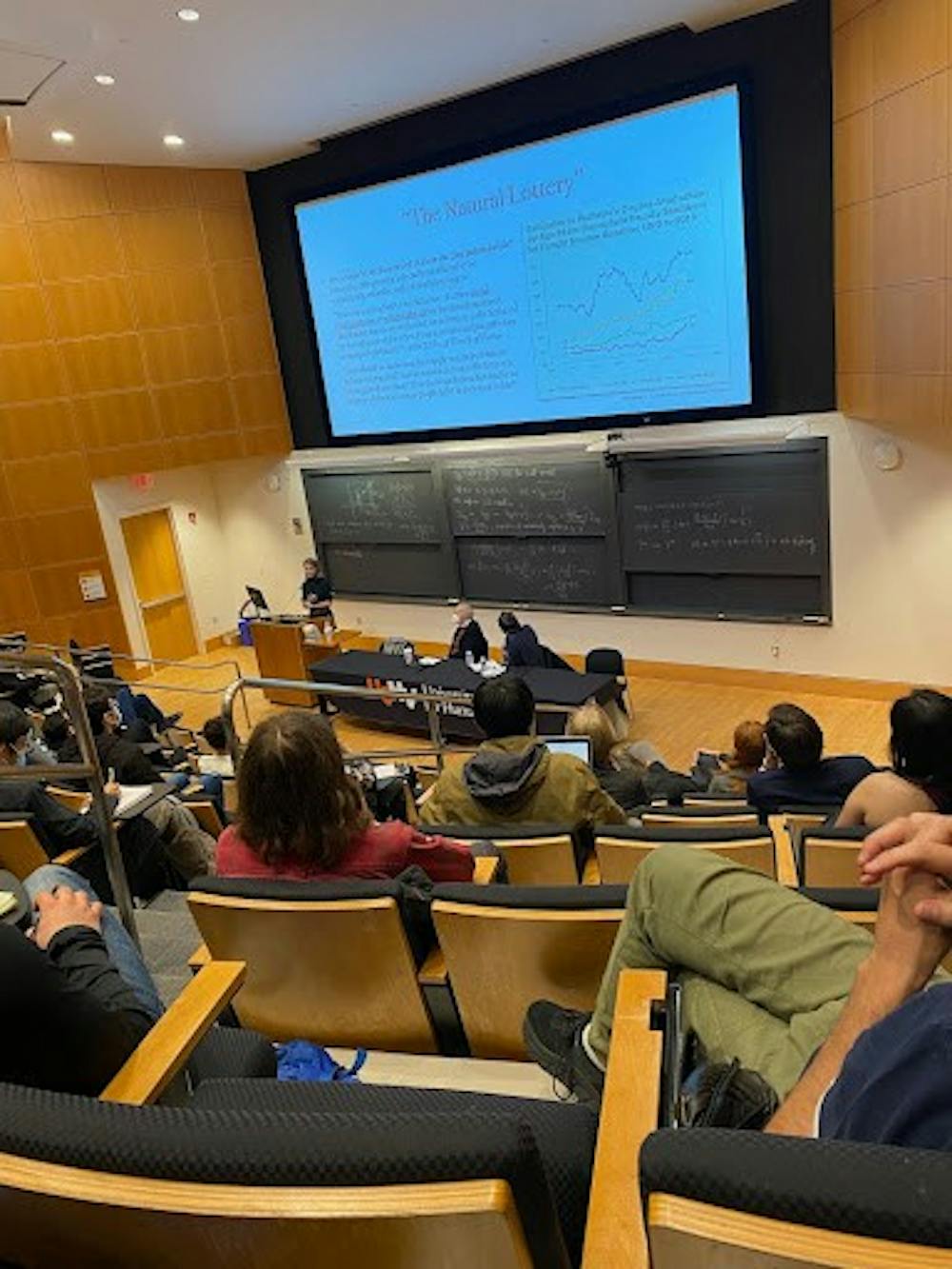On Nov. 17, Kathryn Paige Harden, Professor of Psychology at the University of Texas at Austin and author of the controversial book “The Genetic Lottery and Its Ethical Implications,” addressed an audience at the Friend Center as part of the Ira W. DeCamp Bioethics Seminars hosted by the University Center for Human Values.
Harden, who is a prominent scholar in the conversation surrounding the use of genetic data in the social sciences and whose book was published by Princeton University Press in September, began her talk with a disclaimer to the audience.
“I’m only going to present a very particular slice of the conversation,” she said.
Harden introduced her work through a series of slides explaining how genetic data is collected, analyzed, and applied to social and behavioral outcomes. Her research relies on Genome-Wide Association Studies (GWAS), which seeks to identify the genetic variants in humans that can influence life outcomes by using genomic data of millions of individuals.
Polygenic scores (PGS) from the GWAS data quantify the likelihood of these outcomes and are generally accepted as predictors of biological outcomes. However, Harden argues that they can also be predictors of social and behavior outcomes by highlighting data that individuals with a higher PGS for educational attainment are more likely to attain higher levels of education.
Harden’s main argument is that genetic variation matters in future life outcomes. Since the genetic variation of individuals is a result of the random allocation of their parent’s genetic material, it is based on luck. As a result, she poses the question: “How do we understand and try to achieve a fair society when people differ in their luck in life?”
For Harden, the answer is what she calls “anti-eugenic policy,” which would provide more resources to those who are less “lucky” with their genes. Although she did not offer specific policy proposals, she drew a comparison to the Americans with Disabilities Act, which affords protections and benefits to disabled individuals, as a potential model.
After Harden’s presentation, sociology professor Dalton Conley, coauthor of “The Genome Factor,” was invited to respond.
“There’s so much I agree with in The Genetic Lottery. We’re coming from the same perspective more or less, but I am going to push back on a couple fronts,” Conley said.
He argued that policies applied universally are more effective at reducing inequality than policies that target only the individuals considered disadvantaged.
“We don’t need to know about genes to reduce inequality,” Conley concluded. “When policies are universal and mandatory, they reduce inequality.”
After Conley’s response, the event concluded with a question and answer period.

One audience member worried that Harden’s work could be misconstrued.
“I’m concerned that there’s a way in which this work could fall into reductionism and genetic determinism that could be weaponized by eugenicists,” the audience member pointed out.
These concerns about Harden’s research are not new. In her book “Race After Technology,” Ruha Benjamin, Professor of African American Studies, criticized Harden’s advocacy of this type of genetic research for its “savvy slippage between genetic and environmental factors that would make the founders of eugenics proud.”
Benjamin did not respond to a request for comment.
In response to these concerns, Professor Harden acknowledged the possible dangers but emphasized the potential of her research to improve society via anti-eugenic policy.
After the lecture concluded, Daniel Shaw ’25 spoke to The Daily Princetonian on his thoughts about the talk.
“I’m glad that the University hosted Professors Harden and Conley. I think that it’s critically important that we are having these conversations in the academic sphere, because otherwise we will be ceding the space to fringe actors not bound by things like ethics or peer review — and this isn’t something that we can just ignore.”
Philosophy professor Peter Singer, who is a recent recipient of the Berggruen Prize for Philosophy and Culture and director of the DeCamp seminars, spoke to the ‘Prince’ about his decision to host Harden.
“I heard about her new book and it covers an important topic,” he said. “The implications of genetics for the future society ... it is going to be a growing question in ethical decisions. I hope that this event stimulates them to think about the future, and how we can use the knowledge of genetics in order to achieve a more just and equal society.”
Desmond Lam is a news contributor for the ‘Prince.’ He can be reached at dl2015@princeton.edu.
Alison Araten is a news contributor for the ‘Prince.’ She can be reached at aaraten@princeton.edu.








